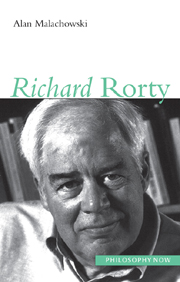Introduction
Summary
I have spent 40 years looking for a coherent and convincing way of formulating my worries about what, if anything, philosophy is good for.
(PSH: 11)Richard Rorty was once described by the distinguished American literary critic Harold Bloom as “the most interesting philosopher in the world”. A thinker whose writing attracts such lofty praise from such elevated sources should normally need little or no introduction. But Rorty is a notable exception.
As a philosopher, he represents a profession that now exerts, for reasons his own work attempts to diagnose, a very modest impact on public opinion and world events. Although Rorty has made admirable efforts to cross the barriers of excessive technicality and abstraction that his chosen profession has erected around what he considers to be, in any case, a largely anachronistic definition of its subject matter, his writing is not yet well known to the general reader. Furthermore, even inside philosophy and those other areas of intellectual endeavour, such as literary theory, where Rorty's ideas have exerted a sizeable influence, the significance of that writing tends to be misunderstood.
In philosophy, where Rorty's thinking has gained some notoriety for trying to turn the subject upside down, his writing is generally underestimated. It is frequently viewed as the work of a rather slipshod iconoclast. Rorty is seen, in this vein, as something of an ‘antiphilosopher’ who leaves himself open to the most superficial objections.
- Type
- Chapter
- Information
- Richard Rorty , pp. 1 - 22Publisher: Acumen PublishingPrint publication year: 2001



